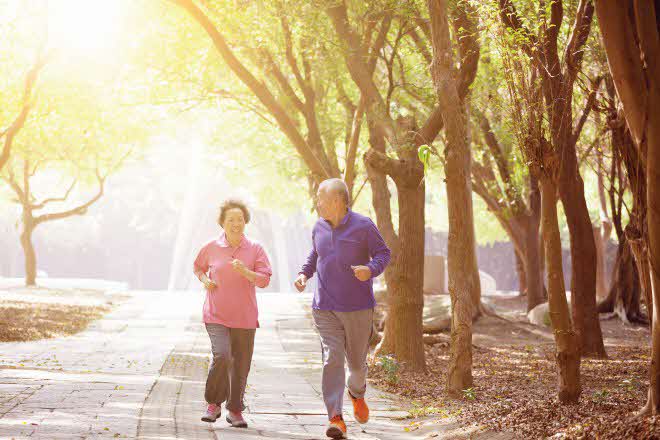Transforming Community Care in 2030
ETHOS Issue 20, Jan 2019
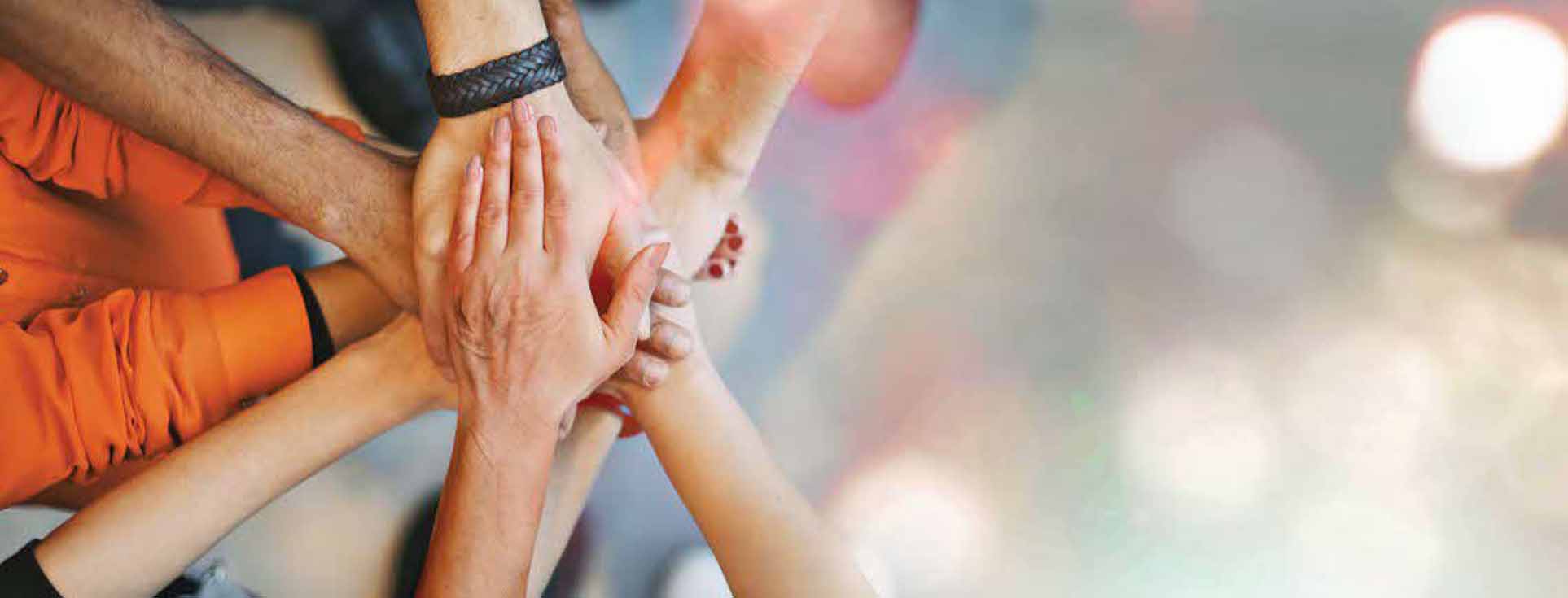
Demographic Transition
Over the next two decades, Singapore is expected to undergo rapid population ageing. By 2030, almost a million Singaporeans will be aged 65 and above. Even as we seek ways to support seniors in remaining healthy and active for as long as possible, the care burden will grow: driven by the onset of frailty among seniors on the one hand, and intensive care needs at the end of life on the other. An increasing number of seniors will need access to services to age in place.
In recent years, the Ministry of Health (MOH) has invested in growing aged care capacity, and piloting new models of care. Under the Integrated Home and Day Care programme for example, seniors can now receive care flexibly at home, at a nearby day care centre, or both, benefiting from care packages customised for their needs. MOH has also partnered with the Housing and Development Board (HDB) to create purpose-built “Active Ageing Hubs”, offering integrated eldercare services in new estates. These one-stop centres provide seniors with a range of services, from active ageing to day care and rehabilitation, and even grocery delivery. At least 10 future HDB estates will have these Active Ageing Hubs by 2020.
As population ageing picks up speed in the next decade, we need to build up a strong community-based support system that can achieve three main goals:
- First, we want to keep our seniors physically and cognitively well for as long as possible, so that they enjoy their golden years.
- Second, we want to keep them socially connected with the community, pre-empting loneliness and isolation.
- Third, we want to enable them to age well in place for as long as possible, minimising unnecessary acute care episodes or premature institutionalisation in nursing homes.
Recent structural moves have opened up new possibilities. The transfer of the Senior Cluster Networks and other programmes such as befriending services, from the Ministry of Social and Family Development to MOH, allows the Ageing Planning Office to take a more comprehensive view of the landscape, in order to strengthen social-health integration and close the social last mile for seniors. The Pioneer Generation Office was also renamed as the Silver Generation Office (SGO) and merged into the Agency for Integrated Care (AIC) to strengthen AIC’s outreach and coordination of aged services across both the health and social domains.
Community Care Vision 2030
Our vision is a community-based support system that is:
- proactive in going upstream to support seniors, pre-empting issues of social isolation and ill health more effectively;
- broad-based in serving seniors, beyond those who are low-income and frail; and
- integrated in weaving together social and health support to support seniors.
The Community Networks for Seniors (CNS) initiative is our national “community-based care system”. This national effort brings together a network of different stakeholders in the community, in every constituency—voluntary welfare organisations (VWOs), the People’s Association (PA) grassroots organisations, regional health systems and government agencies—so that our seniors can get help quickly and in a coordinated manner. In support of this vision, MOH and AIC are building a community care system with four key layers: proactive outreach, health and wellness, community support, as well as senior-centric help and accessible care services.

PROACTIVE OUTREACH
With the merger of the SGO into AIC, we can now put in place a basic system of “preventive health home visits” for seniors. Silver Generation (SG) Ambassadors can reach out to seniors through home visits, to educate them on healthy ageing, as well as proactively identify any health and social issues that seniors may have. Since the SGO started in 2014, it has trained over 3,000 such SG Ambassadors, all of whom are volunteers.
Each SG Ambassador undergoes a series of classroom-based and on-the-job training, before they are deployed for home visits. After their door-to-door visits, these SG Ambassadors complete a Post-Engagement Form assessing each senior’s social, health and financial situation. Seniors who have given their consent are then referred to appropriate active ageing, befriending or care services.
The SGO also follows up with government agencies and community partners to provide support for seniors with needs and to close the last mile. For example, these include the Social Service Office for financial assistance, HDB for home modifications under the Enhancement for Active Seniors Programme, the Health Promotion Board and PA for active ageing programmes and health screenings, AIC for home-based or centre-based aged care services, and relevant VWOs for community befriending or family services. Often, seniors are also linked up with community care providers who offer active ageing programmes and other services. Hence, the approach to supporting seniors is not “touch and go”, but “touch and hold”.
We envision a national health programme to delay frailty, akin to a “school health system”, for seniors.
HEALTH AND WELLNESS
We envision a national health programme to delay frailty, akin to a “school health system”, for seniors. This community-based programme might include chronic disease and functional screening, vaccinations, exercise, and nutrition programmes, on an annual basis. Through this initiative, a community nurse could also identify seniors with needs so that early intervention can be rendered.
For example, we have started functional health screening islandwide in community nodes such as Senior Activity Centres (SACs), Community Clubs/Centres and Residents’ Committee Centres to identify seniors who may be experiencing decline in key functions such as vision, hearing, and oral health. The aim is to help seniors see, hear and eat better. As of September 2018, over 23,000 seniors have been screened, and those with abnormal screening results are referred to relevant care services in the community for further assessment.
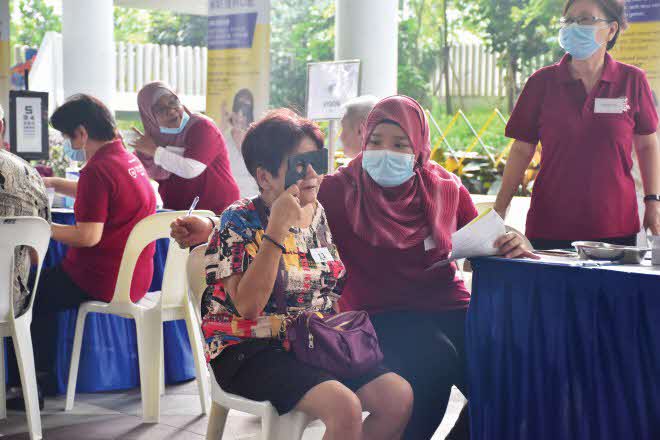
Source: Ministry of Health
COMMUNITY SUPPORT
We aim to build a national community support infrastructure, centred on and wrapped around our seniors. For seniors living alone, we envisage a network of befrienders within the community who will serve as first responders when help is needed. Today, SG Ambassadors are already trained to identify seniors who live alone. Tapping on relevant data from outreach, MOH and AIC work with community befriending providers and PA to mobilise existing pools of befrienders and neighbour helpers, and systematically match them with seniors who live alone.
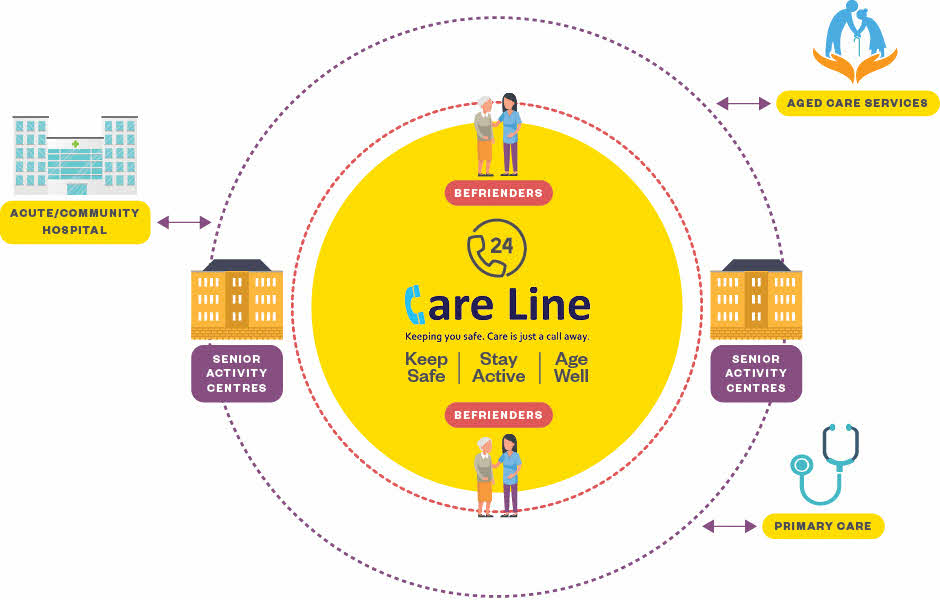
Figure 1. Proactive Community Care
Adapted with permission from the Ministry of Health
- Care Line: As a first layer of social support for seniors who live alone, MOH has piloted a one-stop call centre, “Care Line”, operated by the Changi General Hospital in the Eastern region to provide round-the-clock tele-befriending support services. This is a 24/7 service to proactively engage seniors who are well, checking in on them regularly to help them with reminders for medications and encourage them to participate in active ageing programmes in the vicinity.
- Befrienders: Seniors living alone who have consented for referral to befriending services will receive such services from SACs if they stay in rental flats, or VWOs appointed under the Community Befriending Programme (CBP) in other areas. Befrienders from these Centres will conduct regular visits to seniors’ homes and invite them to join the Centres’ daily activities. CBP Befrienders will make at least two home visits and two phone calls per month to seniors, encouraging them to step out of their homes and join active ageing programmes in the community.
- Neighbour helpers: As a complement to family support, neighbours can help keep an eye out for senior neighbours living alone. This network of neighbours can play an important role as first line responders to support seniors in the event of an emergency (e.g., if a senior falls at home), and can be vital in alerting the family as well as relevant agencies in a timely manner.
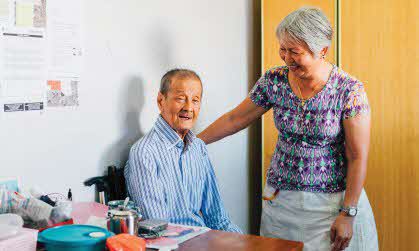 |
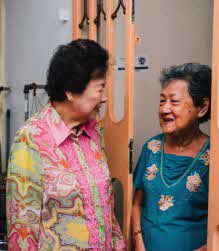 |
|---|---|
.jpg) |
|
Source: Ministry of Health
SENIOR-CENTRIC HELP AND CARE SERVICES
Seniors with mild to moderate frailty and with some family support can tap on a range of home and community care services to help them continue to age in place. For frail seniors with high care needs, and those with weak family support or frail caregivers, MOH will continue to build up nursing home care as part of a robust system of care for our seniors. Institutionalisation is a last resort, as we want to support Singaporeans who wish to age in place, in a physical and social environment they are familiar and comfortable with.
For seniors with complex needs, MOH will seek to develop a networked system on the ground to get them help quickly and in a coordinated manner. Social and health needs are closely connected. Under the CNS which was introduced in 2016, we seek to link up healthcare services, social assistance and community support for a more holistic care plan for these seniors. For example, the health outcomes of seniors may be adversely affected by a lack of social support or when the “social last mile” is not closed (e.g., if seniors lack a means of transport to attend medical appointments). The network brings together different stakeholders in the community to jointly engage and support our seniors. We aim to scale the network islandwide by 2020, tapping on SGO’s outreach.
Efforts are ongoing to also strengthen linkages across care settings—such as through partnerships between the regional health systems and community care providers—to improve post-discharge outcomes and support transition back to everyday life. A community nursing pilot is being conducted where cluster-led, geographically-based nursing teams can reach out to residents in the community to deliver health coaching, provide care in the homes of seniors who have been discharged from hospitals and to also support them with end-of-life care. We will also aim to expand information and referral touchpoints in the community, beyond existing AICare Link physical resource centres at hospitals, and improve awareness of the Singapore Silver Line hotline and Singapore Silver Pages website, to help seniors and their caregivers navigate care services and schemes.
Conclusion
To be a City for All Ages, we need to build up our social infrastructure in tandem with physical infrastructure, to enable our seniors to age confidently in place. By creating communities of care throughout the island, we can grow a robust community care system where seniors can access a range of active ageing and preventive health programmes in every neighbourhood, where every senior living alone or in need of support has a befriender or neighbour looking out for them, and in which the ecosystem of care and support services “grows old with our seniors” as needs evolve.
